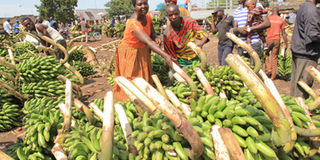Experts issue roadmap to avert post Covid-19 food crisis

A farmer sells her bananas in an open market. Photo Edgar R. Batte
What you need to know:
- Figures released by the World Food Programme in April projected that about a quarter a billion people stood a risk of facing acute hunger.
- In response, global experts in agriculture and environment have released guidelines to prevent a possible crisis, while mitigating climate change and the associated effects.
Agriculture and food supply have not been spared from the devastating effects of the coronavirus pandemic that is ravaging the world.
The measures put in place to stem the spread of the virus have further hit the already distressed supply chains. Experts have warned that the pandemic, coupled with the vagaries of climate change could result into a food crisis for many people.
The United Nations have expressed worry of the pandemic spilling into a global food emergency.
Figures
Figures released by the World Food Programme in April projected that about a quarter a billion people stood a risk of facing acute hunger. In Uganda, the figures stood between 1.2-1.6 million people. The report further highlighted extreme weather conditions as a major cause for food insecurity
In response, global experts in agriculture and environment have released guidelines to prevent a possible crisis, while mitigating climate change and the associated effects.
Innovations
According to the report, Actions to Transform Food Systems under Climate Change developed by research programme on climate change, Agriculture and Food Security (CCAFS), countries need to rethink ways of production that do not worsen the climatic conditions by reducing emissions, put in place safety nets to end dependence on humanitarian aid after pandemics and reduce food loss and wastage.
Farmers are encouraged to adapt new innovations of production that would produce enough food to feed the growing population but also reduce the emission of gases that worsen climate change. Positioning to reduce the impact of weather changes and dependence on rain-fed agriculture and a shift to climate are also encouraged.
“Innovative systems for early action, supported by early warning systems and well-designed triggers, reduce the costs and improve the timeliness and effectiveness of humanitarian intervention. Safety nets, in the form of government social protection programmes that provide cash transfers and other services, are an increasing part of the efforts of low-income countries to protect the wellbeing of the poor,” the report states.
The report further suggests that policies be formulated to dedicate enough finances to propel environmental friendly agriculture. “We envision a world in which all people including future generations, are well nourished and food secure. This is a world achieved through food systems that can sustainably manage current and future stresses, both climatic and non-climatic,” the report states.
Experts also recommend: “Sustainably increasing food production in developing countries in ways that increase incomes and food security in poor, agriculture-dependent rural communities. Doing so could dramatically reduce the need for humanitarian assistance in the coming years, freeing up billions of dollars for investing in social safety nets.”




